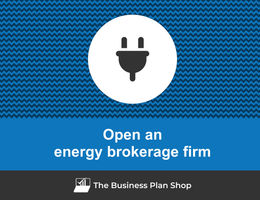How to create a financial forecast for an energy brokerage firm?
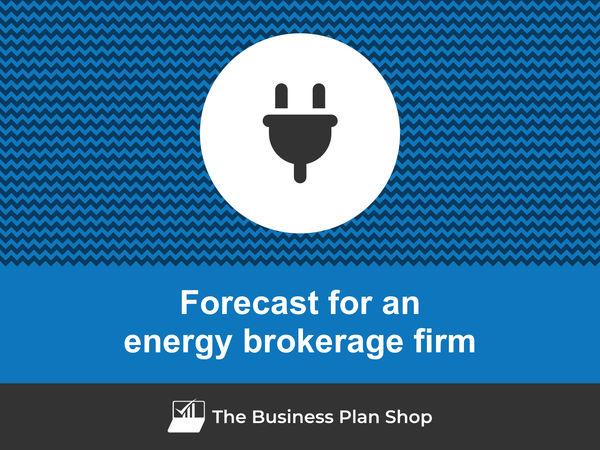
Creating a financial forecast for your energy brokerage firm, and ensuring it stays up to date, is the only way to maintain visibility on future cash flows.
This might sound complex, but with the right guidance and tools, creating an accurate financial forecast for your energy brokerage firm is not that hard.
In this guide, we'll cover everything from the main goal of a financial projection, the data you need as input, to the tables that compose it, and the tools that can help you build a forecast efficiently.
Without further ado, let us begin!
Why create and maintain a financial forecast for an energy brokerage firm?
Creating and maintaining an up-to-date financial forecast is the only way to steer the development of your energy brokerage firm and ensure that it can be financially viable in the years to come.
A financial plan for an energy brokerage firm enables you to look at your business in detail - from income to operating costs and investments - to evaluate its expected profitability and future cash flows.
This gives you the visibility needed to plan future investments and expansion with confidence.
And, when your trading environment gets tougher, having an up to date energy brokerage firm forecast enables you to detect potential upcoming financing shortfalls in advance, enabling you to make adjustments or secure financing before you run out of cash.
It’s also important to remember that your energy brokerage firm's financial forecast will be essential when looking for financing. You can be 100% certain that banks and investors will ask to see your numbers, so make sure they’re set out accurately and attractively.
Need a convincing business plan?
The Business Plan Shop makes it easy to create a financial forecast to assess the potential profitability of your projects, and write a business plan that’ll wow investors.

What information is used as input to build an energy brokerage firm financial forecast?
A energy brokerage firm's financial forecast is only as good as the inputs used to build it.
If you are creating (or updating) the forecast of an existing energy brokerage firm, then you mostly need your accounting information, key historical operating non-financial data, and your team’s input on what to expect for the coming years.
If you are building financial projections for an energy brokerage firm startup, you will need to have done your research and have a clear picture of your competitive environment and go-to-market strategy so that you can forecast sales accurately.
For a new venture, you will also need a precise list of the resources needed to keep the energy brokerage firm running on a day-to-day basis and a list of the equipment and expenditures required to start the business (more on that later).
Let's now take a closer look at the elements that make up your energy brokerage firm's financial forecast.
The sales forecast for an energy brokerage firm
The sales forecast, also called topline projection, is normally where you will start when building your energy brokerage firm financial forecast.
Creating a coherent sales projection boils down to estimating two key drivers:
- The average price
- The number of monthly transactions
To do this, you will need to rely on historical data (for an existing business), market research data (for both new and existing energy brokerage firms), and consider the elements below:
- Changes in government policies and regulations, such as the introduction of new taxes or subsidies, that can impact the average price of energy and the number of transactions.
- Fluctuations in the global energy market, such as supply and demand imbalances, geopolitical events, and natural disasters, can affect the price of energy and the volume of transactions.
- The adoption of renewable energy sources by businesses and households, which can lead to a decrease in demand for traditional energy sources and, consequently, a decrease in your average price and number of transactions.
- Economic conditions, including inflation rates, interest rates, and unemployment rates, can influence the affordability of energy and, in turn, your average price and monthly transactions.
- The development of new technologies and innovations in the energy sector, such as smart grids and energy storage solutions, which can impact the cost of energy and the demand for your brokerage services.
After the sales forecast comes the operating expenses budget, which we will now look into in more detail.
Need a convincing business plan?
The Business Plan Shop makes it easy to create a financial forecast to assess the potential profitability of your projects, and write a business plan that’ll wow investors.

The operating expenses for an energy brokerage firm
The next step is to estimate the costs you’ll have to incur to operate your energy brokerage firm.
These will vary based on where your business is located, and its overall size (level of sales, personnel, etc.).
But your energy brokerage firm's operating expenses should normally include the following items:
- Staff costs: This includes salaries, benefits, and other related expenses for your employees. This could also include hiring costs, training expenses, and employee incentives.
- Accountancy fees: As an energy brokerage firm, you will need to hire an accountant to manage your financial records, prepare tax returns, and provide financial advice.
- Insurance costs: You will need to have insurance coverage for your business to protect against potential risks and liabilities. This could include general liability insurance, professional liability insurance, and property insurance.
- Software licenses: To run your business efficiently, you will need to invest in energy brokerage software, which may require monthly or annual license fees.
- Banking fees: You will need to have a business bank account to manage your finances, and this could include fees for transactions, wire transfers, and monthly maintenance.
- Marketing and advertising: To attract clients and grow your business, you will need to invest in marketing and advertising expenses. This could include website development, social media ads, and industry conferences.
- Rent or office space: Depending on the size of your business, you may need to rent office space or have a dedicated workspace, which could incur monthly rent or lease payments.
- Utilities: As an energy brokerage firm, you will need to cover the cost of utilities such as electricity, water, and internet for your office space.
- Professional development: To stay up-to-date with industry trends and regulations, you may need to invest in professional development for yourself and your employees.
- Travel expenses: You may need to travel for meetings, conferences, or client visits, which could incur expenses for transportation, lodging, and meals.
- Office supplies: To keep your office running smoothly, you will need to purchase supplies such as paper, printer ink, and other office essentials.
- Legal fees: As an energy brokerage firm, you may need to seek legal advice or services for contract reviews, compliance, or other legal matters.
- Telecommunications: You will need to have reliable phone and internet services for your business, which could incur monthly fees.
- Taxes and licenses: You will need to pay taxes on your business income and maintain any necessary licenses or permits to operate your energy brokerage firm.
- Office equipment and maintenance: This could include expenses for purchasing or leasing office equipment such as computers, printers, and furniture, as well as ongoing maintenance costs.
This list is not exhaustive by any means, and will need to be tailored to your energy brokerage firm's specific circumstances.
What investments are needed to start or grow an energy brokerage firm?
Once you have an idea of how much sales you could achieve and what it will cost to run your energy brokerage firm, it is time to look into the equipment required to launch or expand the activity.
For an energy brokerage firm, capital expenditures and initial working capital items could include:
- Office Space: As an energy brokerage firm, you will need a physical office space to conduct your business operations. This could include renting or leasing office space, purchasing a building, or renovating an existing space to fit your needs.
- Technology and Equipment: In order to effectively analyze and manage energy data, you will need to invest in technology and equipment such as computers, servers, software, and other tools to support your brokerage services.
- Furniture and Fixtures: Your office space will require furniture and fixtures such as desks, chairs, filing cabinets, and other office supplies to create a professional and functional workspace for you and your employees.
- Transportation: As an energy brokerage firm, you may need to travel to meet with clients or attend industry events. This could include purchasing a company vehicle or covering the costs of employee travel expenses.
- Training and Development: While this may not fall under the traditional definition of a capital expenditure, investing in the training and development of your employees is crucial for the success of your energy brokerage firm. This could include industry certifications, workshops, and other educational opportunities to enhance your team's skills and knowledge.
Again, this list will need to be adjusted according to the specificities of your energy brokerage firm.
Need a convincing business plan?
The Business Plan Shop makes it easy to create a financial forecast to assess the potential profitability of your projects, and write a business plan that’ll wow investors.

The financing plan of your energy brokerage firm
The next step in the creation of your financial forecast for your energy brokerage firm is to think about how you might finance your business.
You will have to assess how much capital will come from shareholders (equity) and how much can be secured through banks.
Bank loans will have to be modelled so that you can separate the interest expenses from the repayments of principal, and include all this data in your forecast.
Issuing share capital and obtaining a bank loan are two of the most common ways that entrepreneurs finance their businesses.
What tables compose the financial plan for an energy brokerage firm?
Now let's have a look at the main output tables of your energy brokerage firm's financial forecast.
The profit & loss forecast
The forecasted profit & loss statement will enable you to visualise your energy brokerage firm's expected growth and profitability over the next three to five years.
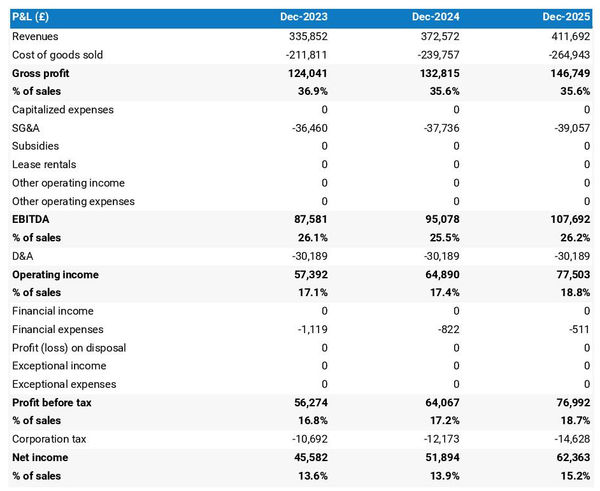
A financially viable P&L statement for an energy brokerage firm should normally show:
- Sales growing above inflation
- Stable or expanding (ideally) profit margins
- A net profit
This will of course depend on the stage of your business: a new venture might be loss-making until it reaches its breakeven point in year 2 or 3, for example.
The projected balance sheet
Your energy brokerage firm's forecasted balance sheet enables you to assess your financial structure and working capital requirements.
It is composed of three types of elements: assets, liabilities and equity:
- Assets: represent what the business owns and uses to produce cash flows. It includes resources such as cash, equipment, and accounts receivable (money owed by clients).
- Liabilities: represent funds advanced to the business by lenders and other creditors. It includes items such as accounts payable (money owed to suppliers), taxes due and loans.
- Equity: is the combination of what has been invested by the business owners and the cumulative profits and losses generated by the business to date (which are called retained earnings). Equity is a proxy for the value of the owner's stake in the business.
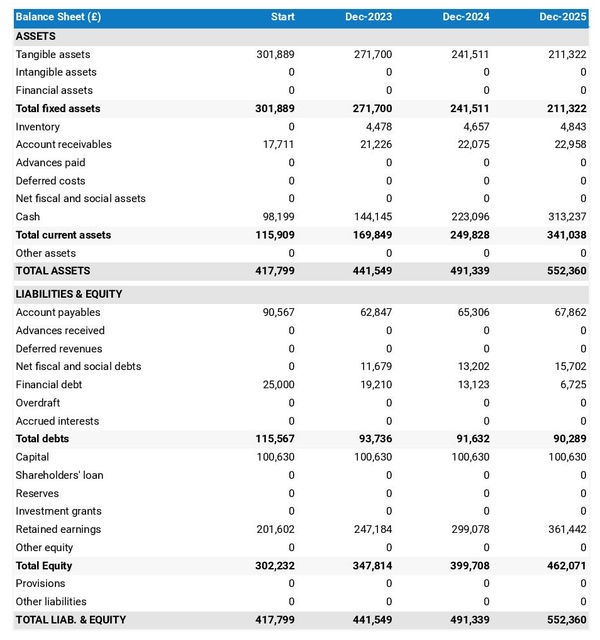
The cash flow projection
The cash flow forecast of your energy brokerage firm will show how much cash the business is expected to generate or consume over the next three to five years.
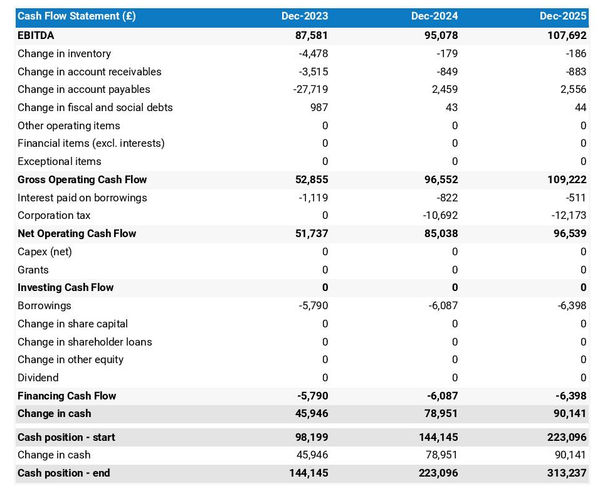
There are multiple ways of presenting a cash flow forecast but from experience, it is better to organise it by nature in order to clearly show these elements:
- Operating cash flow: how much cash is generated by the energy brokerage firm's operations
- Investing cash flow: what is the business investing to expand or maintain its equipment
- Financing cash flow: is the business raising additional funds or repaying financiers (debt repayment, dividends)
Your cash flow forecast is the most important element of your overall financial projection and that’s where you should focus your attention to ensure that your energy brokerage firm is adequately funded.
Note: if you are preparing a financial forecast in order to try to secure funding, you will need to include both a yearly and monthly cash flow forecast in your energy brokerage firm's financial plan.
Need a convincing business plan?
The Business Plan Shop makes it easy to create a financial forecast to assess the potential profitability of your projects, and write a business plan that’ll wow investors.

Which tool should you use to create your energy brokerage firm's financial projections?
Building an energy brokerage firm financial forecast is not difficult provided that you use the right tool for the job. Let’s see what options are available below.
Using online financial forecasting software to build your energy brokerage firm's projections
The modern and easiest way is to use an online financial forecasting tool such as the one we offer at The Business Plan Shop.
There are several advantages to using specialised software:
- You can easily create your financial forecast by letting the software take care of the financial calculations for you without errors
- You have access to complete financial forecast templates
- You get a complete financial forecast ready to be sent to your bank or investors
- You can easily track your actual financial performance against your financial forecast, and recalibrate your forecast as the year goes by
- You can create scenarios to stress test your forecast's main assumptions
- You can easily update your forecast as time goes by to maintain visibility on future cash flows
- You have a friendly support team on standby to assist you when you are stuck
- It’s cost-efficient and much cheaper than using an accountant or consultant (see below)
If you are interested in this type of solution, you can try our projection software for free by signing up here.
Calling in a financial consultant or chartered accountant
Outsourcing the creation of your energy brokerage firm financial forecast is another possible solution.
This will cost more than using software as you can expect as your price will have to cover the accountant’s time, software cost, and profit margin.
Price can vary greatly based on the complexity of your business. For a small business, from experience, a simple three-year financial forecast (including a balance sheet, income statement, and cash flow statement) will start at around £700 or $1,000.
Bear in mind that this is for forecasts produced at a single point in time, updating or tracking your forecast against actuals will cost extra.
If you decide to outsource your forecasting:
- Make sure the professional has direct experience in your industry and is able to challenge your assumptions constructively.
- Steer away from consultants using sectorial ratios to build their client’s financial forecasts (these projections are worthless for a small business).
Why not use a spreadsheet such as Excel or Google Sheets to build your energy brokerage firm's financial forecast?
You and your financial partners need numbers you can trust. Unless you have studied finance or accounting, creating a trustworthy and error-free energy brokerage firm financial forecast on a spreadsheet is likely to prove challenging.
Financial modelling is very technical by nature and requires a solid grasp of accounting principles to be done without errors. This means that using spreadsheet software like Excel or Google Sheets to create accurate financial forecasts is out of reach for most business owners.
Creating forecasts in Excel is also inefficient nowadays:
- Software has advanced to the point where forecasting can be done much faster and more accurately than manually on a spreadsheet.
- With artificial intelligence, the software is capable of detecting mistakes and helping decision-making.
Spreadsheets are versatile tools but they are not tailor-made for reporting. Importing your energy brokerage firm's accounting data in Excel to track actual vs. forecast is incredibly manual and tedious (and so is keeping forecasts up to date). It is much faster to use dedicated financial planning tools like The Business Plan Shop which are built specially for this.
Need a convincing business plan?
The Business Plan Shop makes it easy to create a financial forecast to assess the potential profitability of your projects, and write a business plan that’ll wow investors.

Use our financial forecast templates for inspiration
The Business Plan Shop has dozens of financial forecast examples available.
Our templates contain both a financial forecast and a written business plan which presents, in detail, the company, the team, the strategy, and the medium-term objectives.
Our templates are a great source of inspiration, whether you just want to see what a complete business plan looks like, or are looking for concrete examples of how you should model financial elements in your own forecast.
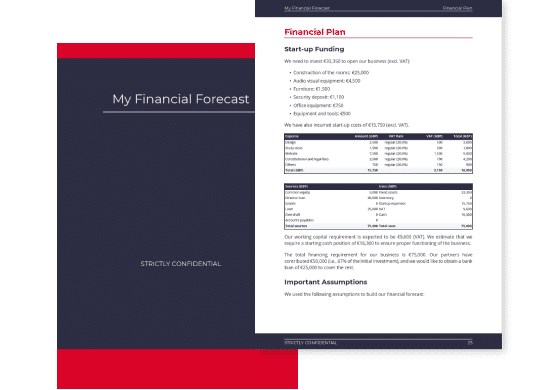
Takeaways
- Having a financial forecast enables you to visualise the expected growth, profitability, and cash generation for your business over the next three to five years.
- Tracking actuals vs. forecast and keeping your financial projections up-to-date is the only way to get a view on what your energy brokerage firm future cash flows may look like.
- Using financial forecasting software is the mordern and easy way to create and maintain your forecasts.
This is the end of our guide on how to build the financial forecast for an energy brokerage firm, we hope you found it useful. Don't hesitate to contact us if you want to share your feedback or have any questions.
Need a convincing business plan?
The Business Plan Shop makes it easy to create a financial forecast to assess the potential profitability of your projects, and write a business plan that’ll wow investors.

Also on The Business Plan Shop
- Example of financial forecast
- How to create a turnover forecast for a business?
- Financial forecast for a business idea
Know someone who owns or is thinking of starting an energy brokerage firm? Share our forecasting guide with them!



